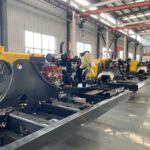Introdução

In the realm of construction equipment, wheel excavators stand out for their versatility and efficiency. They offer numerous advantages over traditional excavators, especially concerning environmental impact. This blog explores the environmental benefits of using wheel excavators, highlighting their role in sustainable construction practices.
Vantagens de Wheel Excavators
Wheel excavators combine the functionalities of both a traditional excavator and a wheeled vehicle, providing superior mobility and agility on construction sites. Unlike tracked excavators that rely on continuous tracks, wheel excavators operate on wheels, which allow them to move quickly and maneuver effectively across various terrains. This versatility makes them suitable for urban environments, where space constraints and the need for precise maneuvering are common.
Reduced Fuel Consumption
One significant environmental advantage of wheel excavators is their improved fuel efficiency compared to traditional tracked excavators. This efficiency is primarily due to their lighter weight and the fact that they do not require continuous track systems, which can consume more fuel. Wheel excavators typically have smaller engines that are designed to optimize fuel consumption without sacrificing performance. As a result, they contribute to lower fuel costs and reduced carbon emissions, making them a greener option for construction projects.
Lower Emissions
Due to their efficient engine design and reduced operational hours, wheel excavators emit fewer pollutants into the atmosphere compared to their tracked counterparts. The combustion engines in wheel excavators are engineered to meet stringent emissions standards, such as those set by the Environmental Protection Agency (EPA) or similar regulatory bodies worldwide. This reduction in emissions not only helps in meeting environmental regulations but also improves air quality on construction sites and in surrounding areas.
Redução de ruído
Noise pollution is a significant concern in urban construction areas, where minimizing disruptions to residents and businesses is crucial. Wheel excavators are generally quieter during operation than tracked excavators, primarily due to their smoother movement on wheels. The noise levels emitted by wheel excavators are lower both in terms of decibel levels and frequency of operation noise, contributing to a more pleasant and less intrusive work environment.
Soil Protection
The mobility of wheel excavators plays a vital role in minimizing soil compaction and damage during construction activities. Unlike tracked excavators, which exert concentrated pressure on the ground through their tracks, wheel excavators distribute their weight more evenly over a larger area. This reduces the risk of soil compaction, preserves soil structure, and minimizes disturbances to vegetation and natural habitats. As a result, wheel excavators are particularly beneficial for environmentally sensitive areas where preserving the ecosystem is a priority.
Case Studies and Data Analysis
Real-world case studies and data analysis provide concrete evidence of the environmental benefits of using wheel excavators in construction projects. For example, a study comparing the environmental impact of wheel excavators versus tracked excavators in urban redevelopment projects found that wheel excavators significantly reduced fuel consumption, emissions, and soil disturbance while maintaining productivity levels. Such studies underscore the practical advantages of adopting wheel excavators for sustainable construction practices.
Environmental Data Table
| Environmental Factor | Wheel Excavator | Tracked Excavator |
|---|---|---|
| Fuel Consumption | Lower | Higher |
| Emissions | Reduced | Higher |
| Noise Levels | Quieter | Louder |
| Soil Disturbance | Less | More |
Cost Efficiency and Environmental Impact

Beyond their environmental benefits, wheel excavators offer cost savings to construction companies over their lifecycle. While the initial investment in wheel excavators may be higher compared to tracked excavators, lower fuel consumption, reduced maintenance costs, and compliance with environmental regulations can result in long-term savings. Construction companies can also benefit from reduced downtime and increased operational efficiency, leading to improved project timelines and client satisfaction.
Conclusão
Para concluir, wheel excavators offer a compelling case for their environmental benefits in construction. Their reduced fuel consumption, lower emissions, noise reduction, and soil protection make them valuable assets for sustainable development. As construction practices evolve towards greater environmental responsibility, wheel excavators will play an increasingly vital role in minimizing the ecological footprint of construction activities.
Perguntas frequentes
Q:What is a wheel excavator?
A:A wheel excavator is a construction machine equipped with a rotating cab and a hydraulic system for digging and loading materials. It operates on wheels rather than tracks, offering enhanced mobility and maneuverability on construction sites.
Q:How do wheel excavators compare to tracked excavators environmentally?
A:Wheel excavators typically have lower fuel consumption, reduced emissions, and quieter operation compared to tracked excavators. They also minimize soil disturbance and can be more suitable for urban construction projects.
Q:Are wheel excavators suitable for all types of construction projects?
A:While wheel excavators excel in urban and less rugged terrains, their suitability for specific projects depends on factors such as site conditions, required digging depth, and mobility requirements. They are commonly used in road construction, urban redevelopment, and utility installation projects.
Q:What are the maintenance requirements for wheel excavators?
A:Regular maintenance of wheel excavators includes servicing the engine, hydraulic systems, and tires. Operators should follow manufacturer guidelines for lubrication, inspections, and replacing worn-out parts to ensure optimal performance and longevity.
Q:Do wheel excavators have any disadvantages from an environmental standpoint?
A:While wheel excavators offer significant environmental benefits, they may have limitations in extremely rough or uneven terrains where tracked excavators could provide better traction and stability. Additionally, their initial purchase cost may be higher compared to some tracked models.


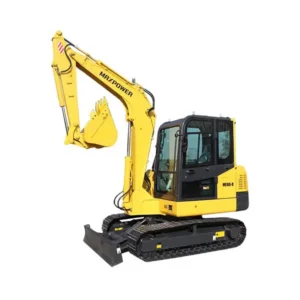
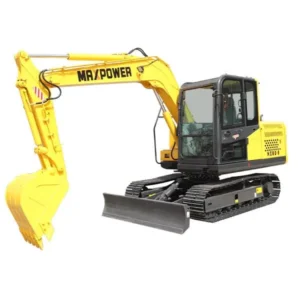
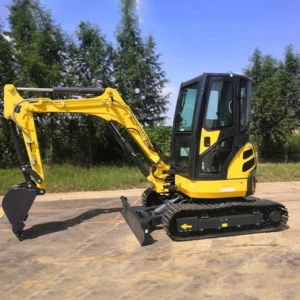
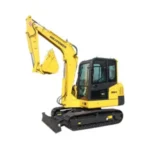

-150x150.webp)
